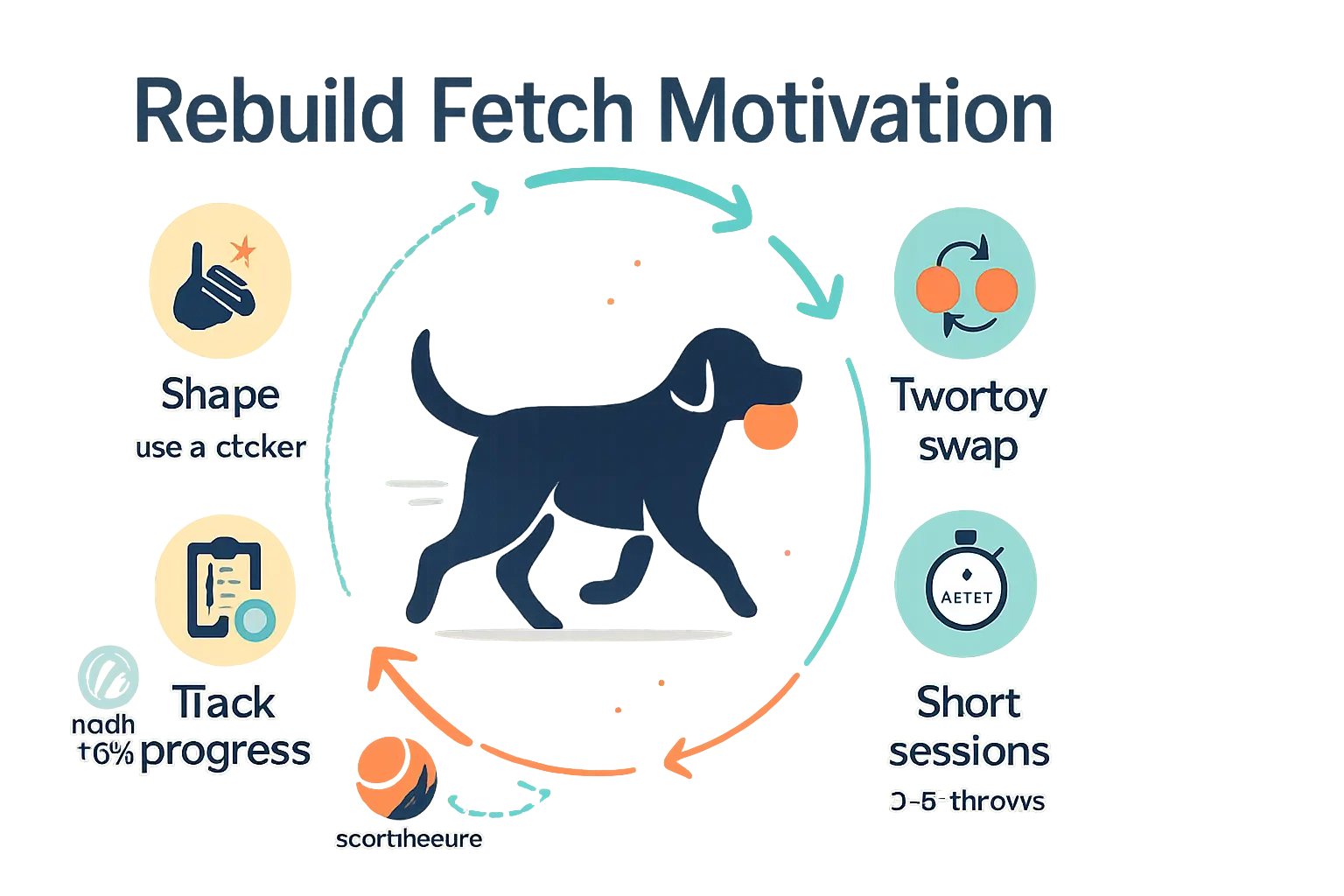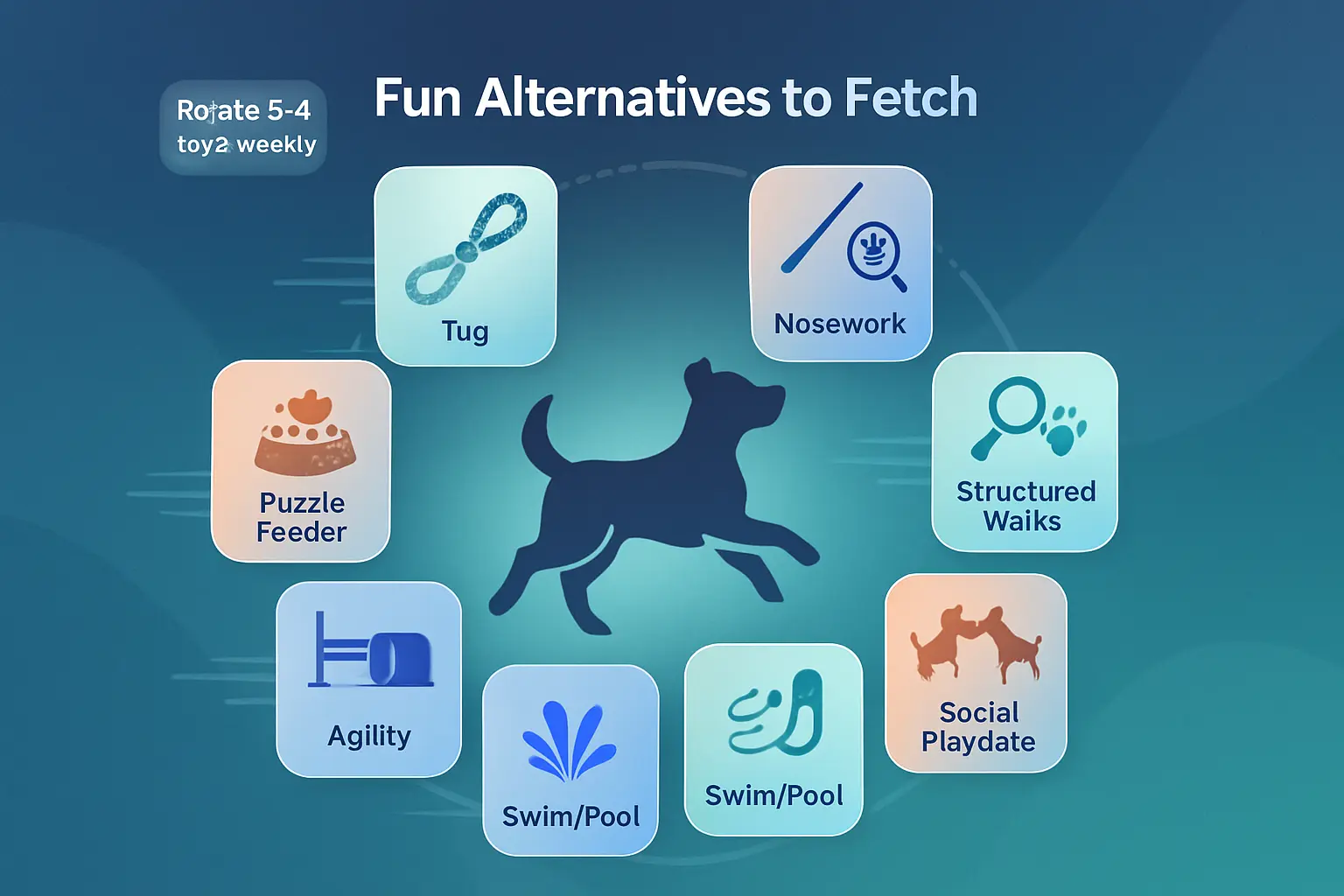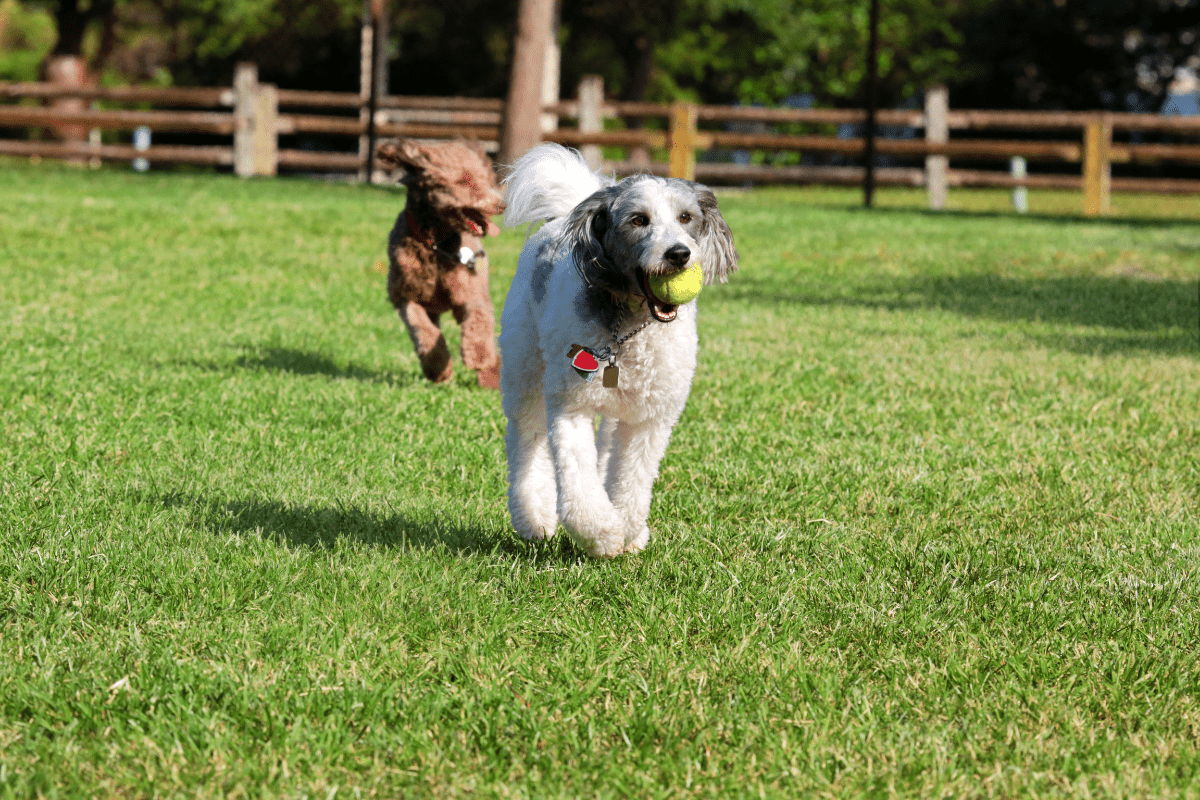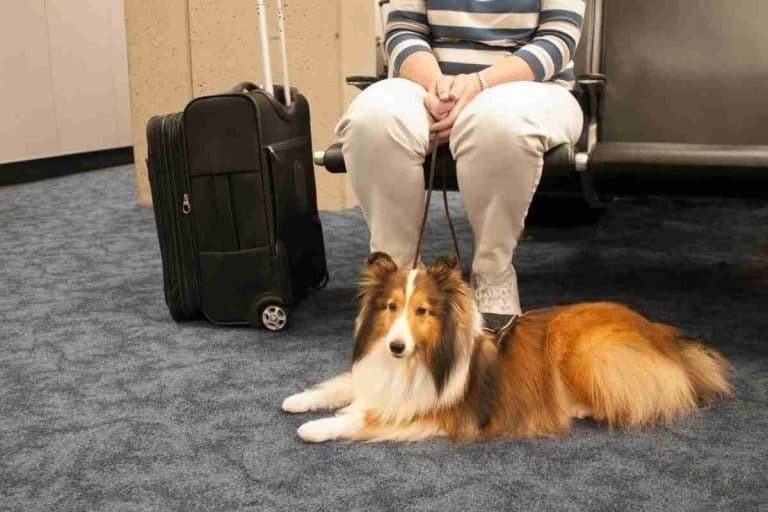10 Reasons Your Dog Won’t Play Fetch Anymore (and How to Fix It)
Last Updated on September 1, 2025
When a once-keen retriever stalls, 10 reasons your dog won’t play fetch anymore often explain the shift. Pain, dental issues, or balance problems can make chasing hard. Hearing or vision loss complicates cues. Some dogs simply get bored, confused about rules, or prefer guarding over returning. Toy texture, noisy spaces, or overexertion add friction. Breed instincts and age also steer motivation.
This post shows owners how to fix it—safely and step by step. It starts with a vet‑first checklist to rule out medical causes. Then it offers simple training wins: shaping, the two‑toy trade, better recall, and clean release cues. Readers also get toy picks, low‑distraction setups, and timing tips that boost success. Age, breed, and temperament tweaks keep play comfortable. If fetch still flops, fun alternatives and a two‑week action plan restore engagement without forcing the game.
Top 10 reasons your dog stopped playing fetch
Dogs stop playing fetch for many clear reasons. Each item below names a likely cause and gives concise, actionable fixes. Owners should observe behavior, try the suggested adjustments, and consult a veterinarian for medical concerns. Maintain short sessions and reward interest to rebuild positive associations.
Pain or health problems (arthritis, dental, vestibular issues)
Pain often reduces a dog’s willingness to chase or carry objects. Arthritis can make running and bending painful. Dental pain makes holding a toy uncomfortable. Vestibular problems affect balance, so a dog may avoid quick turns. A vet exam, targeted pain management, and low-impact alternatives like short hallway tosses help. For ear and balance concerns related to travel and pressure changes, see does flying hurt dogs’ ears for signs owners can watch for.
Loss of hearing or vision that makes the game harder
When sensory input declines, the dog may miss verbal cues or visualize a thrown ball poorly. Adjust by using louder or vibrational toys, carrying a scented toy, and making throws within clear sightlines. Train a reliable recall signal using very short distances and high-value treats. For more on canine hearing range and cues, consult how far can dogs hear to match cues to ability.
Breed instincts or personality—fetch isn’t naturally rewarding for every dog
Some breeds lack strong retrieve drives; others prefer independent activities. Personality matters more than size. Owners should test alternative games—tug, scent work, or puzzle toys—to find what motivates the dog. Short, voluntary sessions where the dog decides to engage will reveal preferences. If a breed guide helps with activity planning, see resources like dog breeds that fit under airplane seat for breed-specific behavior notes and energy expectations.
Boredom from repetitive play or overuse of the same toy
Repetition makes fetch predictable and dull. Rotate toys weekly to renew interest and introduce novelty by altering the environment—throw from different positions or add simple obstacles. Vary rewards: a quick treat after a successful catch, a brief play session, or a praise routine. Limit sessions to five to ten minutes to keep fetch exciting rather than routine.
Confusion about the rules or lack of early toy exposure
Dogs that never learned fetch rules may not understand returning or releasing the toy. Break the game into micro-steps: entice the dog to pick up the toy, call back with high-value rewards, and teach a clear drop command. Use a long hallway to reduce distractions. Short, frequent training sessions create clarity faster than long, unfocused play.
Resource guarding or keep‑away behavior
If a dog treats the toy like a prized possession, it may run off instead of returning. Address guarding with structured trade training: offer a higher-value treat in exchange for the toy and celebrate the trade. Avoid chasing the dog, which can reinforce keep-away. For behavioral context and calming strategies during transitions, owners can review similar behavior topics such as dog refusing to get into car, which outlines patience and stepwise desensitization methods.
Past negative experiences or fear associated with the toy
A startling event while playing—loud noise, accidental step on a paw—can create a negative association. Counter-condition slowly: present the toy while pairing with treats and calm praise, then progress to gentle touches and short tosses. Work below the dog’s fear threshold and reward every brave interaction. For general anxiety-reduction approaches, see 9 natural ways to remedy your dog’s travel anxiety for techniques that transfer to play-related fear.
Overexertion, fatigue or post‑exercise soreness
After intense activity, muscles need recovery. A dog that previously loved fetch may avoid it when tired or sore. Reduce session length, lower throw distance, and add longer rest days between high-energy play. Implement warm-ups—short walks and gentle range-of-motion—before active play. If performance drops suddenly, schedule a vet check to rule out underlying causes.
Wrong toy type or unpleasant texture (including worn tennis balls)
Some dogs dislike the feel or smell of certain toys. Worn tennis balls can be abrasive and may hurt teeth. Test different shapes, materials, and scented options. Soft rubber launchers, plush toys for carry-focused dogs, or scented cloths can reframe the game. Replace old, abrasive balls with specifically designed dog toys to prevent dental discomfort and renew interest.
Environmental distractions or unsafe play locations
Noisy parks, busy streets, or slippery surfaces can stop a dog from chasing. Move play to a fenced yard, quiet field, or inside on non-slip flooring. Choose times with fewer distractions and ensure the surface is joint-friendly. For broader travel and location safety tips that owners use to evaluate play areas, consult essential dog travel tips and gear for road trips.
How to rule out medical issues first
When a dog stops playing fetch, a medical problem can cause the change. Owners should prioritize a clinical evaluation before changing training or routines. A clear timeline of when the behavior shifted helps the veterinarian connect symptoms to causes. While many issues are minor, some require diagnostics and treatment. If the dog shows any pain, lameness, or behavioral changes, arrange veterinary assessment promptly.
Vet checklist: what to mention and which exams/tests matter
Provide the vet with concise details: onset of the change, exact behaviors, recent injuries, activity level, appetite, weight trends, medications, and recent travels. The vet will perform a physical exam and focused orthopedic and neurological checks. Common tests include:
- Bloodwork (CBC and chemistry) to detect infection, organ dysfunction, or inflammation.
- Thyroid testing for middle‑aged or older dogs with lethargy.
- Radiographs (x‑rays) of hips, spine, or suspected joints.
- Urinalysis to rule out systemic illness.
- Ear and dental exams for localized pain that reduces play drive.
Advanced imaging, such as MRI or CT, may follow if neurological signs appear. Mention any anxiety or travel stress, which can suppress play — see 9 natural ways to remedy your dog’s travel anxiety.
Signs that require urgent veterinary care
Some signs demand immediate attention. Bring the dog to emergency care if any of the following occur:
- Sudden, severe lameness or inability to bear weight.
- Marked swelling, obvious fracture, or deformity.
- Collapse, fainting, or seizures.
- Difficulty breathing, blue gums, or extreme lethargy.
- Uncontrolled bleeding, persistent vomiting, or diarrhea with weakness.
Prompt action prevents deterioration. If owners suspect acute pain, do not delay.
Short‑term modifications to protect a dog in pain
Until a diagnosis arrives, reduce activities that stress joints and soft tissue. Practical short‑term changes include:
- Replace high leaps and hard retrieves with short, low‑impact tosses.
- Use soft toys and throw gently to avoid sudden acceleration.
- Shorten sessions and watch for subtle pain cues, such as limping or hesitation.
- Provide non‑slippery footing indoors and ramp access to furniture or cars.
- Avoid DIY analgesics; only use medications prescribed by the veterinarian.
These measures protect injured structures and keep the dog comfortable while diagnostics proceed. Schedule a vet appointment when possible; seek emergency care for any red‑flag signs.
Simple training fixes to get fetch interest back

When a dog loses interest in fetch, simple, consistent training often restores motivation quickly. Owners should first rule out pain, vision or dental issues with a vet. If health checks are clear, address game value, predictability and the dog’s experience of success. Begin with very short sessions—three to five throws—and keep every repetition positive. Swap passive throws for interactive moments: enthusiastic cues, close-range rolls and immediate rewards. Replace worn toys with something novel or add scent and texture to increase salience. Use high-value, small treats that the dog receives immediately after a successful return. Rotate toys and rewards so the dog cannot predict the next outcome; unpredictability raises engagement. Track progress in short logs: distance returned, enthusiasm score and frequency of release problems. Small, measurable gains build momentum without overwhelming the dog. Read essential dog travel tips and gear for ideas on portable reward containers and durable toys that make short practice sessions easier while away from home.
When motivation returns, slowly increase complexity. Owners should avoid long, punishment-based corrections. Positive, planned practice keeps fetch fun and reliable.
Reintroduce the toy with shaping and high‑value rewards
Shaping breaks fetch into tiny, achievable steps. Owners should reward any movement toward the toy: looking, moving forward, touching and picking up. Reward each successive approximation more generously. Use tiny, high‑value treats that the dog cannot resist. Fade extra lure slowly so the dog learns the toy itself predicts reward. If the dog has aversive associations with the old toy, introduce a clean, novel item and let the dog sniff it without pressure. Pair the new toy with favored activities like short walks or gentle play to build positive context.
Keep sessions brief and frequent—three to six one‑minute drills daily. Mark successful behaviors with a clear, consistent cue or click, then deliver the reward within one second. If calming supplements or natural remedies help a nervous dog focus, owners can consult resources such as natural ways to remedy your dog’s travel anxiety for ideas that also support training focus. Gradual, reward‑rich shaping re-associates the toy with fun and success.
Use the two‑toy swap and trade game to teach return and release
The two‑toy game teaches voluntary return and a clean, immediate release. Start with two identical toys or one toy plus a higher‑value item. Throw Toy A, then show Toy B immediately after the dog picks up Toy A. Offer Toy B as a trade, reward the exchange and throw Toy B. Repeat at short range until the dog reliably comes back to swap. Increase distance only after the dog performs exchanges confidently.
If the dog guards the toy, owners should avoid tugging or forced prying. Instead, trade for a food reward or a more exciting toy. Gradually phase out food trades by making Toy B consistently the better choice. Use the game in different environments to generalize the behavior. For leash-controlled practice in restricted spaces, see techniques for management like how to secure a dog in car with leash, which offers practical tips for safe short‑range recalls and controlled play while traveling.
Build recall and duration before increasing distance
Reliable return and hold duration form the foundation for long‑range fetch. Begin recall work indoors or in a fenced yard where distractions are minimal. Reinforce the instant the dog turns toward the owner, not only when it arrives. Use a two‑phase reward: a small treat for immediate orientation and a larger reward for arrival and release. Add a short hold cue by rewarding the dog for keeping the toy in mouth for one to three seconds before release. Increase duration gradually, only when the dog succeeds consistently.
Once short‑range recalls and holds are solid, increase distance in measured steps. Practice in new locations so the dog generalizes the behavior off‑site. Outdoor adventures demand stronger recall; owners can prepare by following outdoor safety and readiness advice found in 9 tips for hammock camping with your dog, which highlights useful control and recall principles for variable terrain and novel environments.
Marking, timing and short sessions to keep motivation high
Precise marking and swift reward delivery preserve the dog’s motivation. Use a clear marker word or a click to signal exact moments of success. Deliver the reward within one second. Short sessions prevent fatigue and frustration; aim for five to eight high‑quality repetitions per session. End sessions while the dog still shows enthusiasm to preserve eagerness for the next round.
Vary rewards and occasionally include surprise jackpot treats to maintain excitement. If travel or motion sensitivity limits session length, plan practice at calm times and avoid long car rides before training. For strategies to keep dogs comfortable during travel and practice, consult tips on making car rides pleasant in how to make car rides enjoyable for your motion-sick pup. Consistent timing, short bursts and precise marking sustain motivation and rebuild a joyful fetch routine.
Teach reliable releases and stop keep‑away
Reliable releases form the foundation of a healthy fetch game. When a dog treats retrieval as a prize to keep, owners often reward guarding or chasing without meaning to. Start by managing the situation: shorten sessions, use high-value rewards, and remove distractions. Work in a quiet space so the dog can learn the exchange pattern without pressure.
Keep sessions short and predictable. Offer a clear sequence: send, retrieve, trade, repeat. Use two identical toys or hold a small handful of treats so the swap becomes automatic. Gradually increase the challenge only after the dog consistently releases.
If training happens during trips or outings, plan supplies and safety. Bringing spare toys and treats makes positive exchanges simple. See practical packing and gear suggestions at essential dog travel tips and gear for road trips to keep sessions smooth away from home.
Owners should watch body language for signs of guarding. If tension appears, pause and reset. Consistent, calm exchanges teach the dog that giving up the toy leads to better outcomes, not punishment.
Positive exchange (trade for toy/treat) instead of force
Force breaks trust and often escalates guarding. A positive exchange uses a better offer to encourage release. Present a high-value treat or a second toy the instant the dog opens its mouth. Timing matters: reward the release within a second so the dog links the action to the reward.
Use a designated exchange cue such as “trade” and pair it with the action. Start with low-pressure games where the dog holds an item while the handler approaches. Show the treat, then swap calmly. Repeat until the dog moves toward the treat on cue.
For anxious or easily distracted dogs, combine the exchange with calming strategies. Natural calming techniques can help dogs accept the reward without stress. See tips for calming anxious pups at 9 natural ways to remedy your dog’s travel anxiety, many of which apply during training.
Gradually phase treats to lower-value rewards or to a second toy. Reinforce consistency: every successful release earns the exchange. That reliability replaces forcing with a reliable, repeatable pattern.
Step‑by‑step to teach “drop it” and “give” cues
Use short, frequent sessions. Begin indoors with low-distraction and a low-value item. Follow these steps:
- Offer the item and let the dog hold it briefly.
- Present a high-value treat near the dog’s nose. Say “drop it” as the dog releases.
- Immediately reward and praise, then remove the treat so the dog learns swapping.
- Repeat until the dog drops for a neutral cue without hesitation.
- Introduce a second toy. Practice “give” to pass the toy to the handler, rewarding the hand-to-hand transfer.
- Increase difficulty: add distance, mild distractions, and longer holds before cueing.
- Proof the behavior during actual fetch. Send the toy, call back, cue “drop it”, trade, and reward.
Keep rewards immediate and consistent. If the dog repeatedly refuses, step back to an easier stage. Marking the release with a clicker or a quick word speeds learning.
Prevent accidentally rewarding running off or guarding
Chasing a dog to get a toy teaches that running away pays. Owners should avoid pursuit. Instead, use a long line to control distance while preserving choice. If the dog bolts, stop engaging, then call calmly and reward returns.
Teach a reliable recall separately from fetch. Reward returns with high-value treats or play only after the dog comes back. Deny access to the toy until the dog offers calm, voluntary contact. That clarity removes the incentive to guard.
Manage resource guarding by removing triggers during training. Use crates or seat restraints when necessary to prevent snatching during car rides. For practical methods to secure a dog safely while traveling, consult 5 ways to secure a dog crate in car. A stable environment reduces anxiety-driven guarding.
Finally, adopt a neutral body language. Turn away briefly when the dog tenses. Offer the exchange only when the dog relaxes. Consistent rules and calm handling remove the accidental rewards that sustain keep‑away behavior.
Choose the right toy, place and schedule

Owners who want fetch back should treat play like a short, focused training session. Choosing the right toy, place and schedule reduces frustration for both dog and owner. Match the toy to the dog’s drive, check safety first, and time sessions for energy peaks. A small change can restore enthusiasm quickly.
Best toy types for different play styles and safety notes (avoid abrasive tennis balls)
High‑drive retrievers respond to durable rubber balls and chuckit‑style launchers. Food‑motivated dogs prefer treat‑dispensing balls or soft puzzle toys. Gentle players often like plush or squeaky options. Avoid abrasive tennis balls that wear teeth and gums. Inspect toys for exposed seams or small parts. Replace frayed toys promptly. For strong chewers, pick tough rubber or rope alternatives rated for heavy use.
Rotate toys and add scent or food to renew interest
Rotate two to four toys weekly to keep novelty high. Introduce scent by rubbing a toy with a favorite blanket or a bit of cooked chicken. Use high‑value treats or spread a thin layer of peanut butter for scent enrichment. Start with brief five‑minute fetch drills, then reward with a treat or tug. These small reinforcements rebuild the fetch loop without forcing long sessions.
Pick safe, low‑distraction spaces and ideal times of day
Choose a fenced yard, quiet park corner, or an indoor hallway for focused retrieves. Avoid busy dog parks when training fetch; distractions break the habit. Aim for morning or evening walks when temperatures and noise are low. For older or joint‑sensitive dogs, use soft surfaces and shorter throws. For water‑loving dogs, consider a puncture-proof dog pool as an alternative play area. Try one change per week and observe progress.
Consider age, breed and temperament adaptations
When a dog stops playing fetch, start by separating physical capacity from motivation. Age, breed and temperament together shape what a dog finds rewarding. Puppies have short attention spans and growing bones. Adults often enjoy repetitive games if the reward matches their drive. Seniors may lose interest because of arthritis, dental pain or slower recovery.
Temperament matters as much as age. A high‑drive retriever may view fetch as a job. A cautious or anxious dog may avoid running after an unfamiliar throw toy. Matching play style to personality prevents frustration for both dog and handler.
A practical step is to observe sessions and note changes in gait, speed and eagerness. If mobility looks reduced, route concerns to a vet. If the dog shows stress signals instead, reduce intensity and change context. For breed-specific tendencies and guidance on selecting activities aligned with instinct, see resources about dog breeds that fit under airplane seat which include breed notes useful for tailoring exercise.
Adjust expectations and intensity for puppies, adults and seniors
Puppies need multiple short, easy sessions. Keep throws under five meters. Use soft, lightweight toys to protect growing teeth and joints. Limit high‑impact retrieving until a vet confirms closed growth plates. Reward quick returns with treats and praise to build a positive fetch habit.
Adult dogs tolerate longer sessions but still benefit from variation. Rotate toys, switch between ball and tug, and add occasional hidden retrieves to maintain interest. If attention wanes, shorten sessions and raise reward value rather than extending playtime.
Seniors require gentle modifications. Reduce repeated high‑impact running and replace some throws with low‑impact alternatives. Walks with frequent sniff breaks, short supervised chases on soft ground, and controlled underwater treadmills (if available) conserve joints. Always check for pain, stiffness or breathing changes after play. For practical puppy handling and safe short trips that mirror exercise pacing, consult guidance on how to transport a puppy in a car without a crate.
Breed‑driven alternatives if fetch isn’t rewarding (eg. scentwork for hounds)
Some breeds lose interest in fetch because it misunderstands their instincts. Hounds, for instance, favor nose work over visual chase. Terriers chase moving prey; herding breeds crave direction and control. Recognize the instinct and swap tasks to match it.
Suggested alternatives: scentwork and nose games for hounds, tug or flirt‑pole work for terriers, structured herding‑style direction drills for herding breeds, and water retrieves for retrievers. Rotate activities so the dog gets both mental and physical engagement.
Training these alternatives increases motivation and reduces the risk of boredom‑related behavior problems. Start simple: hide treats in easy spots, teach a calm retrieve with a soft toy, or introduce a flirt pole for short bursts. Observe the dog’s body language to find what excites it most. For examples of breed‑specific activity suitability, see practical notes like can Jack Russells swim? which illustrates tailoring play to a dog’s abilities.
Energy management: when to replace long fetch sessions with other exercise
Fetch can burn a lot of energy fast. But sometimes it becomes inefficient or unsafe. Substitute long sessions when interest drops, recovery slows, or the surface is too hard. Use varied formats to manage total exertion without cutting exercise quality.
Alternatives include interval play (short bursts with rest), scent walks that encourage sniffing and slow mental work, puzzle feeders for enrichment, and controlled swimming for low‑impact cardio. Hikes with periodic off‑leash checks deliver sustained stamina work without repetitive sprinting.
Monitor heart rate, respiratory recovery and limb soreness after activity. If recovery takes longer than 10–20 minutes, swap future sessions for lower‑impact options. Test adjustments by replacing one long session per week with a sniff walk or puzzle game and note behavior changes. For practical gear and trip ideas that support varied exercise routines, review essential dog travel tips and gear for road trips. Try a short alternative today and observe whether the dog returns to fetch more willingly later.
Fun alternatives if fetch remains a no‑go

When a dog stops chasing a ball, owners should replace that outlet with varied activities that match the dog’s drive and health. Offer options that stimulate scent, prey drive, social needs, or the body. Rotate games daily to keep novelty high. Pair short sessions with high‑value rewards and clear cues so the dog learns new rules quickly. For owners who travel or exercise outdoors, practical gear and routine changes help maintain activity levels during trips or busy weeks. See practical packing and outing suggestions at essential-dog-travel-tips-and-gear-for-road-trips for ideas on keeping a dog’s routine consistent away from home.
Keep sessions short, positive, and predictable. Watch for signs of fatigue or discomfort. If physical pain or anxiety seems likely, consult a veterinarian before escalating activity. Small tweaks can restore enthusiasm without forcing fetch.
Tug, flirt‑pole chasing, nosework and puzzle feeders
Tug and flirt‑pole games tap into natural chase and bite drives. They let handlers control intensity and reward quickly. Use a tug toy with a clear start and stop cue. For flirt‑poles, start slow and keep sessions under five minutes for most dogs. Nosework and puzzle feeders shift focus to scent and problem solving. They reduce repetitive strain and engage the brain. Introduce nosework with easy hidden treats and increase difficulty gradually. Puzzle feeders slow eating and provide mental work during alone time. Owners can learn simple search games and scent puzzles from resources on calming and enrichment strategies at 9-natural-ways-to-remedy-your-dogs-travel-anxiety.
Rotate three to four toy types weekly. Monitor for resource guarding during tug. Reward calm hand‑overs. These alternatives preserve play value while avoiding a forced return to fetch.
Agility, structured walks, and social playdates
Structured activity channels energy without relying on fetch. Agility foundations build focus, coordination, and handler communication. Begin with low jumps, tunnels, and target stations. Short, consistent training sessions produce faster gains than long, unfocused time. Structured walks emphasize purposeful movement. Add interval training: brisk five‑minute segments followed by relaxed sniff breaks. That mix increases fitness and reduces boredom. Social playdates at a trusted friend’s home or fenced park provide varied play styles. Supervise new interactions to prevent roughhousing or escalation. For outdoor trip ideas and safe ways to plan active outings, consult practical tips in 9-tips-for-hammock-camping-with-your-dog.
Record progress with short notes. If a dog resists group play, try one controlled session with a calm peer. Consistent structure often restores confidence and motivation without repeating fetch drills.
How to keep interaction and enrichment without forcing fetch
Preserve the human‑dog bond by offering attention, training, and varied play that respect the dog’s limits. Short training bursts using clicker or marker words create reliable engagement. Swap high‑energy fetch sessions for supervised pool play, scent games, or cooperative tasks. Water games suit many dogs that no longer enjoy land chases; owners can find durable options in lists like 10-refreshing-puncture-proof-dog-pools.
Keep interactions voluntary. Present choices: a toy, a sniff walk, or a cuddle. Let the dog choose and reward participation. Track which options elicit tail‑wagging and repeat those. If the dog still shows low interest, schedule a vet check and consider a behavior consult. A brief professional assessment prevents missed medical or emotional causes and speeds recovery of joyful play.
Action plan: what to try today and when to get professional help
This section gives a short, safe troubleshooting plan dog owners can try immediately, plus a structured two‑week training checklist and clear signs that a trainer or veterinary behaviorist is needed.
Immediate 30‑minute plan to test interest and safety
Spend 30 minutes split into three 10‑minute blocks. First, perform a quick physical check: feel the neck, shoulders, mouth, hips and paws for tenderness. Use gentle massage and watch for flinching. Next, offer a high‑value object or treat the dog rarely gets. Toss it a short distance and praise quietly for any chase or pickup. If the dog refuses, try a short tug or roll the toy to trigger prey drive. Keep sessions calm and end on a positive note. If the dog shows pain, collapse, limping, or sudden aggression, stop and contact a veterinarian.
2‑week training checklist and progress markers
Follow a daily routine of multiple short sessions (4–6 sessions of 3–5 minutes). Key steps: 1) Build interest with high‑value rewards; 2) Shape pickup by rewarding any mouth contact; 3) Reinforce holding for one, then three seconds; 4) Gradually increase throw distance; 5) Add a consistent release cue. Track markers: seeks toy, chases, picks up, returns, and reliably drops on cue. If the dog reaches three markers within two weeks, continue increasing variability. If progress stalls after two weeks, adjust reward value, location, or session timing before seeking outside help.
When to contact a trainer or veterinary behaviorist
Seek professional help if any of the following occur: sudden loss of play accompanied by pain signs, aggression when approached with toys, marked anxiety or fear, or no measurable progress after targeted, consistent two‑week training. Owners should consult a veterinarian first to rule out medical causes. For persistent anxiety or fear, consider behaviorist referral and review calming strategies such as those in 9 natural ways to remedy your dog’s travel anxiety. Book a vet appointment or trainer consultation promptly when safety or welfare is in question.
Summary
10 Reasons Your Dog Won’t Play Fetch Anymore (and How to Fix It) maps the most common causes—pain, sensory changes, breed tendencies, boredom, confusion about rules, guarding, bad experiences, fatigue, toy issues, and distracting environments—and shows owners exactly how to respond. The post emphasizes ruling out medical problems first, then rebuilding motivation with short, positive, well-timed sessions.
Clear training frameworks follow: shape interest in the toy, use the two-toy swap to teach returns, install reliable “drop it”/“give” cues, and choose the right toy, place, and schedule. Age, breed, and temperament adaptations keep play safe and rewarding, while alternatives like tug, flirt‑pole, nosework, and structured walks deliver enrichment when fetch isn’t the best fit. A practical 30‑minute triage and a two‑week checklist help owners track progress and know when to call a veterinarian or trainer.
Key Takeaways
- Rule out pain first: Book a vet exam if fetch interest drops suddenly or pain signs appear; follow the provided checklist and heed urgent red flags.
- Keep sessions short and positive: Use 3–5 minute drills, precise markers, and rapid rewards to rebuild motivation without fatigue.
- Teach clean returns and releases: Run the two‑toy swap, reinforce “drop it”/“give”, and avoid chasing to prevent keep‑away.
- Match toy, place, and timing to the dog: Ditch abrasive tennis balls, rotate toys, add scent, pick low‑distraction spaces, and train at energy peaks.
- Adapt for age, breed, and temperament: Lower impact for seniors, simplify for puppies, and offer breed‑aligned alternatives if fetch isn’t rewarding.
- Follow the action plan: Try the 30‑minute safety check, track the two‑week markers (pick up, hold, return, drop), and seek professional help if progress stalls.
FAQ
- What medical issues commonly stop dogs from playing fetch?
Arthritis, dental pain, ear/vestibular problems, vision or hearing loss, and post‑exercise soreness are frequent causes. A vet exam with orthopedic, neurological, ear, and dental checks helps identify them.
- How can owners quickly teach a reliable “drop it”?
Trade for a high‑value treat or second toy the instant the dog opens its mouth, mark the release, and reward within a second. Practice indoors first, then use the cue during short, easy retrieves.
- Why does a dog run off with the ball instead of returning?
Keep‑away is often reinforced by owners who chase, and some dogs guard valued items. Use a two‑toy swap, avoid pursuit, and reward voluntary returns to reset the pattern.
- How long should it take to see progress after restarting training?
Many dogs show small gains within 1–2 weeks of 4–6 short daily sessions. If there’s no measurable progress, adjust rewards, location, or timing and consult a professional.
- What fetch modifications help seniors or dogs with discomfort?
Use soft toys, very short throws on non‑slip surfaces, and limit repetitions. Warm up first, keep sessions brief, and schedule a vet check for any stiffness, limping, or reluctance.







